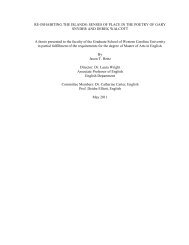SUMMERS, KAREN CRADY, Ph.D. Reading Incest - The University ...
SUMMERS, KAREN CRADY, Ph.D. Reading Incest - The University ...
SUMMERS, KAREN CRADY, Ph.D. Reading Incest - The University ...
You also want an ePaper? Increase the reach of your titles
YUMPU automatically turns print PDFs into web optimized ePapers that Google loves.
106<br />
<strong>The</strong> plots of these three plays move toward “degendering of authority” by including the<br />
possibility that their women may not be controlled but may instead gain control, leading<br />
to chaos.<br />
In Webster’s play, though there is an implication that the Duchess may have<br />
deserved her fate for marrying outside her class and for disobeying male authority (her<br />
brothers) 6 , this reason for Ferdinand’s disapproval is complicated by his<br />
unacknowledged sexual desire for his sister. Presumably, the usual reason for a brother’s<br />
interest in his sister’s choice of husband is control of the widow’s estate. Presciently, her<br />
brother issues an ominous warning:<br />
CARDINAL.<br />
You may flatter yourself,<br />
And take your own choice; privately be married<br />
Under the eaves of night----<br />
FERDINAND. Think 't the best voyage<br />
That e'er you made; like the irregular crab,<br />
Which, though 't goes backward, thinks that it goes right<br />
Because it goes its own way: but observe,<br />
Such weddings may more properly be said<br />
To be executed than celebrated. (I.II)<br />
Accosted by her brothers, who are intent on her remaining unmarried, the Duchess<br />
assures them that she shall never marry. She defies convention, however, by choosing her<br />
own course of action and by her duplicity. Her attitude is in opposition to Panthea’s.<br />
That lady’s sole purpose seems to have been to not only accede to the conventional<br />
societal desire to see women married to suitable men, but also to display happiness and<br />
6 William Painter’s Palace of Pleasure (1567) is known to be Webster’s source for <strong>The</strong> Duchess of Malfi.
















